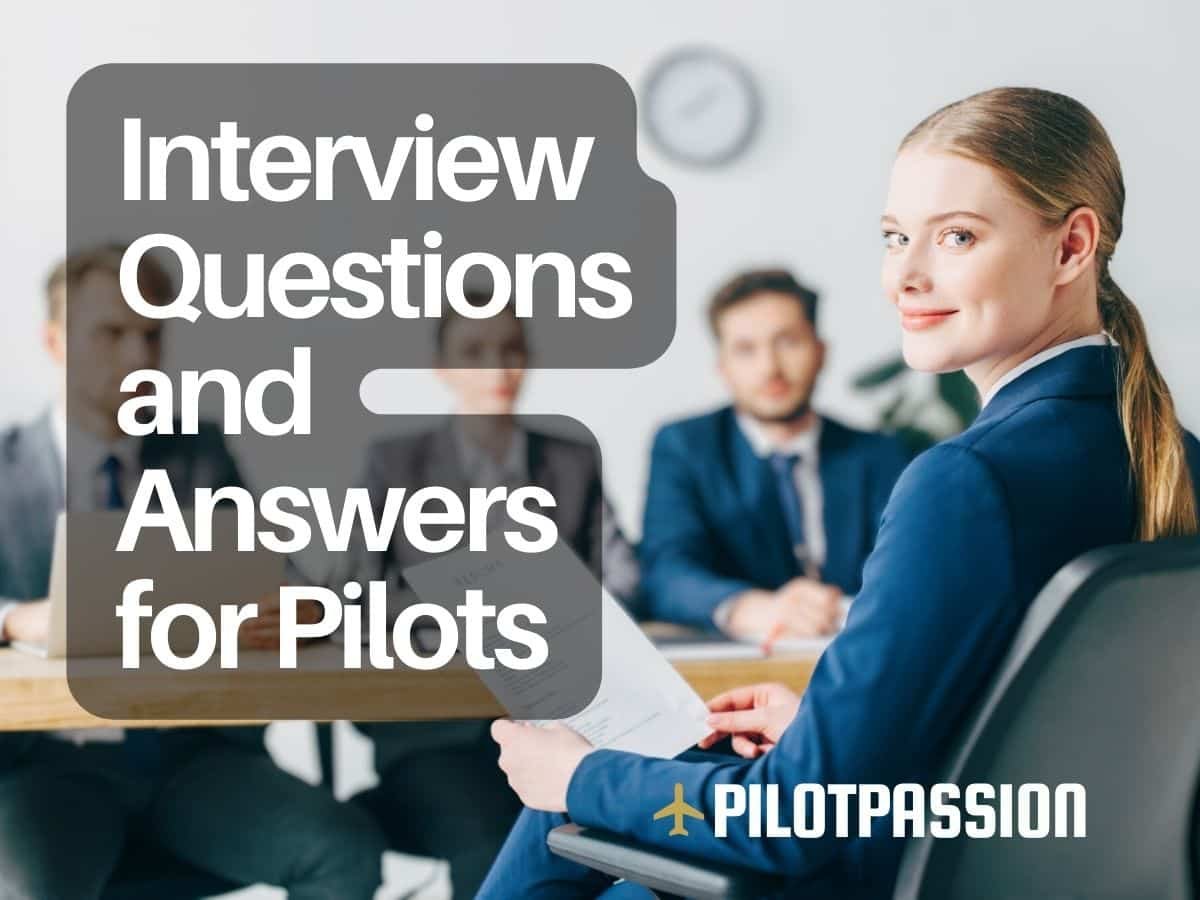Landing a pilot’s job? It’s like threading a 747 through a needle. Brains, skills, hours in the sky, and a pinch of the right mojo – that’s your boarding pass to ace an airline’s ironclad gates.
Keep it snappy, they say; you’re up against the flying elite. So, suit up, your cockpit awaits. Keep it to a ‘Mayday’ minimum, and maybe, just maybe, you’ll make the flight deck. Good luck, Maverick. The skies are choosy. But they might just choose you. Fly past the crowd, gear up for the maverick ride of a lifetime. This is your life. A life of aviation’s ripest fruit.
This guide will walk you through some of the most common pilot interview questions asked of pilot candidates, along with tips for crafting winning answers. It’s worth it – you’ve seen the latest airline pilot salaries, right?
Let’s get started!

Sample Pilot Interview Questions and Answers
1. Why Do You Want to Be a Pilot?
This question tests your passion and commitment to an aviation career. Emphasize your lifelong fascination with flying, early experiences that sparked your interest, and any related hobbies or activities you pursue in your personal time. Discuss the aspects of the job that most appeal to you – the technical complexity, thrill, and pride that comes with this prestigious position.
2. Why Should We Hire You?
Use this opportunity to highlight your technical qualifications and skills. Reference your education, certifications, flying hours, aircraft models you’re licensed to operate, and any special training you have undertaken. Also emphasize soft skills like communication, leadership, and your ability to perform well under pressure. Share an example that demonstrates why you would be an asset to the airline.
3. How Do You Handle Stressful Situations?
As a pilot, you’ll frequently face high-stakes stress, so interviewers want to know you can stay calm and focused when the pressure is on. Share an example of a difficult situation you faced, the actions you took, and the positive result. Emphasize how you make logical decisions under stress.
4. How Do You Ensure Passenger Safety?
Safety is the top priority for any pilot. Discuss your rigorous adherence to pre-flight procedures, checklists, and safety protocols. Share any training that helped you develop your safety-focused mindset. Provide an example of a time you noticed a potential safety issue and took action to resolve it.
5. What Are Your Strengths and Weaknesses?
Highlight technical strengths like your flying proficiency, aircraft systems knowledge, and navigation abilities. For weaknesses, choose humble examples like struggling with public speaking in the past, and share how you actively worked to improve.

6. Describe a Time You Failed and What You Learned
Share an example of a setback early in your flying career and your process to recover. Showcase lessons that improved your abilities as a pilot, not personal shortcomings. Demonstrate grit, accountability, and your determination to continually enhance your skills.
7. How Do You Prioritize Competing Demands?
Pilots juggle multiple in-flight tasks and pressures. Share your workflow strategies for managing simultaneous requirements, being attentive to instrumentation, communicating with air traffic control, and addressing passenger needs. Give a real example if possible.
8. How Do You Stay Current on Aviation Technology and Safety Standards?
Highlight any professional training programs, certifications, industry publications or events you participate in to stay updated on the latest aviation advances. Share examples of an important new technology, regulation or safety practice you recently learned about.
9. Describe your experience flying in challenging weather conditions.
Focus on your training and composure in handling low visibility, turbulence, or high winds. Share an example of a difficult situation and how you maintained aircraft control.
10. How do you ensure you get adequate rest before a flight?
Discuss your sleep hygiene and strategies for avoiding fatigue. Give examples of times you recognized tiredness before flying and took steps to get proper rest.
11. What do you do to minimize pre-flight stress?
Share your pre-flight routines and mindset tactics to remain calm before and during flights. Mention relaxation techniques, positive self-talk strategies, and any stress management training undertaken.
12. How do you maintain aircraft systems knowledge and proficiency?
Highlight any supplemental systems training, self-study practices, or professional development initiatives you undertake. Provide examples of recent knowledge acquired.
13. How do you stay motivated and engaged as a pilot, flight after flight?
Share your passion for aviation along with mindset tips and routines that keep you focused. Give examples of small in-flight goals you create and times you went the extra mile.
14. Tell me about a time you faced a medical emergency onboard. How did you manage it?
Walk through a real or hypothetical scenario. Discuss stopping escalation, consulting others, delegating tasks, contacting ATC, and prioritizing passenger well-being.
15. How do you foster positive relationships within the flight crew?
Share crew resource management principles and your collaboration approach. Provide examples of resolving conflicts or mentoring junior co-pilots. Emphasize communication and teamwork.
16. How do you establish passenger trust and confidence as a pilot?
Discuss your professional demeanor, timely and transparent communication, and calm handling of abnormal situations. Share examples of passenger interactions.
17. Tell me about a time you made a mistake as a pilot. What did you learn?
Choose a small early career mistake. Emphasize the self-reflection, training and process changes afterwards. Demonstrate growth mindset and commitment to continuous improvement.
18. Where do you see your aviation career in 5 years?
Share your professional goals and airline loyalty. Discuss desires for new certifications, aircraft types, leadership roles or training positions. Convey your long-term passion for flying.
19. What interests you most about working for our airline?
Highlight aspects that drew you to apply. Mention route networks, fleet, company culture, training programs, etc. Show you’ve researched the airline.
20. How do you maintain situational awareness during all phases of flight?
Share vigilance strategies like constantly scanning instrumentation, staying ahead through planning, and collaborating with crew. Give in-flight examples.

21. What qualities make a great flight captain?
Discuss leadership, authority, operational excellence, teaching abilities, and serving crew and passengers. Share how you exemplify any of those qualities.
22. How do you stay current with updated FAA regulations and requirements?
Mention memberships in pilot groups, FAA communications, airline provided training, and independent study habits. Give a recent regulatory example.
23. Tell me about a time you effectively handled an angry or difficult passenger.
Share a real example or discuss de-escalation techniques, calm authority, diverting issues, following protocol, and minimizing disruption.
24. What do you do if a crew member is unfit to fly but reluctant to step down?
Discuss having a private conversation, emphasizing regulations and safety, encouraging them to self-report, and if needed, escalating the issue through proper channels.
25. How would you brief the flight crew and passengers for an emergency landing?
Talk through priorities like contacting ATC, assigning crew roles, securing the cabin, requested passenger brace positions, and delivering calm updates throughout.
26. Do you feel the pilot role has become over-automated in modern aircraft? Why or why not?
Provide your perspective on automation reliance vs the continued need for pilot skill, vigilance and quick critical thinking in abnormal situations. Give reasoned examples.
27. Where do you see opportunities to improve the commercial flight experience for passengers?
Share ideas like more transparent communication, safety information accessibility, comfort offerings, or technology integration, based on passenger feedback.
28. What feedback have your previous captains and instructors given about your piloting skills?
Highlight positive competencies they observed like safety-mindedness, trainability, steady hands, emergencies response, CRM, checklist usage, etc. Demonstrate your strengths.
29. How do you maintain professionalism on long haul or repetitive flights?
Discuss mental habits and focus strategies to avoid complacency. Share examples of going the extra mile despite fatigue or boredom. Highlight your diligence.
30. Do you believe the airline could do better when it comes to safety practices?
Provide a thoughtful critique – perhaps more reporting transparency or enhanced mental health resources. Emphasize you’re offering constructive feedback to an already safety-focused airline.
31. Tell me about a time you had to make a diversion or unscheduled landing.
Explain the circumstances, your realignment of priorities to safety, communications with crew/ATC/passengers, and actions taken for a successful diversion.
32. What is a personal area of development you are working to improve as a pilot right now?
Share a current growth and learning goal, such as mastering a new aircraft or avionics system, improving CRM, navigating challenging terrain, etc. Describe how you are enhancing this competency.
33. How would you maintain order and oversight during an emergency evacuation?
Discuss coordinating the crew’s pre-assigned roles, delegating tasks, establishing control of passenger flow, accountability procedures, and compliance with safety protocols.
34. How do you ensure you are mentally prepared for a long international flight?
Share needed rest, adequate nutrition, mindfulness techniques, mental checklists and flight plan review. Emphasize commitment to pre-flight diligence for such flights.
35. How do you maintain physical health and fitness as a professional pilot?
Highlight a fitness regimen, proper nutrition, responsible rest habits, annual physicals, and any training required to perform emergency procedures. Discuss aeromedical resources used.
36. What would you do if a personal issue impacted your fitness for duty before a flight?
Affirm you would immediately self-report to be removed from duty until the issue is fully resolved. Note appreciation for the airline’s support programs and resources.
37. How do you keep your piloting skills sharp during extended leaves like maternity or medical?
Discuss use of simulators, self-study, remedial training prior to return, meeting with check pilots, and any recertification required to return fully competent.
38. What feedback can you offer about our fleet or operations from your perspective as an experienced pilot?
Provide constructive observations – perhaps maintenance handling, cabin comfort, or route scheduling. Offer thoughtful, solutions-focused insights stated with humility.
39. How do you maintain a healthy work-life balance given the demands and scheduling of aviation?
Share strategies like planning quality time off, avoiding overwork, prioritizing family, and pursuing hobbies. Emphasize you understand the importance of work-life balance to avoid burnout.
40. What experience do you have collaborating with flight attendants and other airline staff?
Share positive examples of communicating with other teams to coordinate flight needs, resolve issues, and ensure safe, seamless service for passengers.
41. What do you find most rewarding about working as a commercial airline pilot?
Share your passion for aviation, pride in bringing passengers to their destinations, appreciation for the airline team, and enjoying amazing views and experiences that few get to be a part of.
42. In your opinion, what makes a skilled and effective flight instructor?
Discuss qualities like exceptional knowledge, teaching abilities, listening skills, modeling best practices, enabling trainee confidence, providing effective feedback, and leading by example.
43. How would you maintain a sense of empathy when faced with frequent passenger complaints?
Acknowledge the mental fatigue of addressing negativity but staying engaged and solution-focused. Share how you maintain perspective and your commitment to empathic service.
44. How do you typically deal with delays or unexpected schedule changes?
Highlight your adaptability, problem-solving, effective communication with airline staff and passengers, and commitment to safety over expediency. Share an example if possible.
45. What do you enjoy most about collaborating with other members of the flight crew?
Discuss camaraderie, collective expertise, resource management strategies, compartmentalized responsibilities, coaching opportunities, and continuously learning together.
46. How do you proactively address potential safety concerns from crew members or passengers?
Emphasize listening without judgement, validating concerns, following reporting procedures, and reinforcing the airline’s diligent safety culture. Share an occasion you did this.
47. Tell me about a time you needed to discipline or correct an aircraft mechanic or technician. How did you handle it?
Sensitively discuss the private feedback approach taken, rules/regulations emphasized, and desire to maintain a culture of accountability and safety.
48. Do you have any hesitations about the heavy time demands of a piloting career?
Acknowledge the challenges but reinforce your commitment and passion. Share how you will maintain work-life balance and responsibility to be fully present and rested for flight duties.
49. How would you calculate the aircraft’s V-speeds and explain their significance?
Walk through determining the key V-speeds – V1, VR, V2 – from aircraft manuals based on its weight, flap setting, weather conditions, runway length, etc. Explain the significance of each speed in the takeoff sequence, such as:
- V1 – Critical engine failure recognition speed. The speed beyond which the takeoff should no longer be aborted.
- VR – Rotation speed. The speed at which the pilot should gently pitch up to lift off the runway.
- V2 – Takeoff safety speed. The minimum speed to be maintained after liftoff for safety and optimal climb performance.
Discuss the importance of precisely calculating these speeds each flight for performance, safety margins, and compliance with aircraft operating limitations. Share your diligence in this process as a pilot.
50. How do you stay current on new avionics systems and EFB capabilities on modern aircraft?
Pilots should regularly review training materials and operating manuals for new aircraft types to fully understand the EFB tools at their disposal. Pursuing supplemental systems courses and simulations can help remain proficient as well.
51. What experience do you have utilizing EFBs for calculations, charts, checklists, weather data, and other tools?
Discuss extensive experience with a range of EFB capabilities, including pre-flight computations, accessing real-time weather updates, managing electronic checklists, and replacing paper charts. Share how these tools have enhanced efficiency and situational awareness.
52. How can EFBs both improve safety and introduce distractions if not managed properly?
Explain that while EFBs streamline access to critical data, pilots must never lose focus on physical aircraft operations. Endorsing TRM principles and setting EFB usage limits helps avoid over-reliance.
53. What benefits and potential pitfalls do you see in the industry’s transition from paper to electronic flight bags?
Note EFB benefits like real-time access to information, while underscoring risks like system failures. Paper backups and proficiency without EFBs remains critical.
54. Tell me about a time you faced a technical issue with an EFB during a flight. How did you troubleshoot and manage the situation?
Share an example of an EFB failure and quick reference of paper backups while collaborating with other crew. Discuss minimizing disruption.
55. How do you balance utilization of EFB capabilities with fundamental hand-flying and paper checklist proficiency?
Emphasize the importance of maintaining both hand-flying proficiency and utilizing EFB capabilities. Both skills are essential for pilots.
Questions and Answers For Flight Instructors Interviewing at Flight Schools
56. What attracted you to a career as a flight instructor?
Discuss a lifelong passion for aviation along with a desire to teach and mentor the next generation of pilots. Highlight the rewards of witnessing student growth.
57. What qualifications and experience make you a strong candidate for this flight instructor role?
Highlight specific licenses and ratings held, total flight hours, and previous instruction experience. Reference working with diverse students.
58. How do you adapt your teaching style to the needs of individual students?
Note listening skills to assess students’ strengths and weaknesses, then tailoring explanations, demonstrations, and pacing accordingly. Give examples.
59. How do you maintain both patience and authority when students make mistakes?
Share the importance of understanding the student’s perspective and providing thoughtful guidance. Discuss promoting self-analysis over criticism.
60. What techniques do you find effective for overcoming student fears or lack of confidence?
Give examples like relating personal experiences, simulators for skill practice, setting progressive goals, and focusing feedback on growth areas.
61. How do you stay motivated when students require multiple repetitions to grasp key concepts?
Discuss viewing setbacks as learning opportunities. Share that student breakthroughs provide intrinsic motivation as an instructor.
62. What strategies have you found effective to prepare students for solo flight?
Mention comprehensive procedures review, repetitive practice of takeoffs and landings, emphasizing checklist usage, and ensuring mastery of communications protocols before solo sign-off.
63. Do You Have Any Questions for Us?
Prepare 2-3 insightful questions that show your engagement and interest in the airline. Ask about opportunities for professional development, the airline’s safety record and culture, or challenges and goals for the future. This demonstrates your enthusiasm for the role.
Tips for Acing Pilot Interview Questions
- Thoroughly research the airline and stay updated on industry news
- Read through our aviation glossary and jargon guide
- Review typical technical and behavioral interview questions
- Prepare specific stories that highlight in-demand pilot competencies
- Exhibit professionalism, confidence, and a safety-focused mindset
- Ask thoughtful questions that show your interest in the airline
- Follow up with a thank you note reiterating your fit and enthusiasm
Helpful Video with Pilot Interview Questions and Answers
Further reading: LinkedIn has a good guide on this topic here.
Industry Insights from the Front Line of Aviation
Being an airline pilot demands far more than just technical competency. To gain perspective on the key intangibles that separate exceptional candidates, I consulted with two veteran pilots at major US airlines.
With over 15 years flying the Embraer E170, Captain Norris has conducted hundreds of interviews and assessments. “Beyond flying skills, I’m always looking for candidates who demonstrate a stellar safety mindset along with adaptability to handle diverse scenarios,” he emphasized.
Similarly, Captain Branco flies the Bombardier CRJ-900 and has evaluated many aspiring aviators over her long career. “An aviation psychologist once told me that integrity, resilience, and exceptional decision-making under pressure are key predictors of success – so I’m listening for those qualities,” she explained.
Both captains highlighted that today’s pilots need more than just technical proficiency – you must excel in judgement, leadership, and safety awareness to operate at the highest levels.
Use their insights to focus your preparation and showcase these critical competencies.
Wrapping Up
With meticulous preparation using this interview questions and answers for pilots guide, you’ll demonstrate the technical abilities and leadership potential needed to begin an exciting and rewarding career as an airline pilot.
Best of luck!
